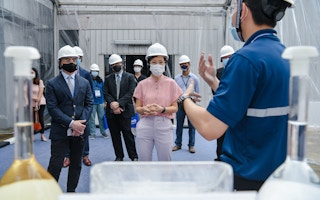A facility for recycling lithium-ion batteries has opened in Southeast Asia, the world’s dumping ground for discarded consumer electronics.
To continue reading, subscribe to Eco‑Business.
There's something for everyone. We offer a range of subscription plans.
- Access our stories and receive our Insights Weekly newsletter with the free EB Member plan.
- Unlock unlimited access to our content and archive with EB Circle.
- Publish your content with EB Premium.
Located in the industrial district of Jurong in Singapore, the S$30 million (US$22 million) plant aims to recycle 14 tonnes, or the equivalent of 280,000 lithium-ion smartphone batteries, per day.
It is the first such facility in Southeast Asia, the global centre for e-waste recycling following the closure of China’s borders to hazardous waste in 2018.
The new centre opens four months ahead of the introduction of Southeast Asia’s first extended producer responsibility (EPR) scheme for electronics manufacturers and technology firms. Singapore’s EPR law makes firms responsible for the collection and recycling of the electronics they sell.
Singapore is Southeast Asia’s largest per capita e-waste generator by far. The city-states produces 20kg per person, almost three times the volume of Malaysia, the regional bloc’s next biggest e-waste producer. Singapore discards the equivalent of 147 iPhones every 10 seconds.
Owned by electronic waste recycler Tes-Amm, the new plant claims to be able to recover 90 per cent of the precious metals found in batteries such as nickel, lithium and cobalt, with a claimed purity of 99 per cent.
Battery metals are increasingly sought-after commodities for use in smartphones, solar panels and electric vehicles (EVs), but recycling them is expensive and dangerous, as batteries contain hazardous materials. Tes says its facility does not release contaminants like heavy metals or volatile organic compounds into the atmosphere.
Elsewhere in Southeast Asia, e-waste is commonly recycled by the informal sector, where in countries such as Vietnam, Indonesia and Cambodia, waste pickers earn about 25 cents per kilogram of collected scrap. Precious metals are retrieved by burning electronics in open settings or using acid baths.
Tes-Amm claims that its new centre, called Tes B, is the most sustainable battery recycling operation of its kind. The plant, which is partially powered by solar energy, uses a new approach to recycling batteries, lowering the carbon footprint of tradtional battery recycling by using less heat and water.
The centre will process waste batteries through corporate deals with IT companies and manufacturers, and will not yet take in used batteries from the city-state’s municipal waste system. Singapore processes some e-waste, but most of it is contaminated after getting mixed with other types of waste, so it is incinerated. Currently, just 6 per cent of Singapore’s e-waste is recycled.
Thomas Holberg, global vice president of battery operations for Tes, told Eco-Business that the biggest challenge for battery recycling is ensuring a reliable stream of uncontaminated batteries.
Much of the recovered material from the recycling plant will be exported overseas to make new products. While there are strict laws for moving hazardous waste between countries under the Basel Convention, Tes has permits that allow the shipment of e-waste.
Holberg said that Tes would consider exporting the technology to other parts of Southeast Asia and beyond, because of strong interest from technology companies and governments. “We will continue to evaluate all opportunities and markets including Southeast Asia over the coming months, but you can expect Tes battery recycling to be in more countries this year,” he said.
Tes B launches a month after Singapore announced new policies that remove barriers to electric vehicle (EV) adoption. More than 7 million tonnes of EV lithium-ion batteries will need to be recycled globally between 2021 and 2030, according to environmental group Greenpeace.
Electronic waste is the world’s fastest growing solid waste stream, with almost 50 million tonnes of e-waste expected to be produced globally this year.










